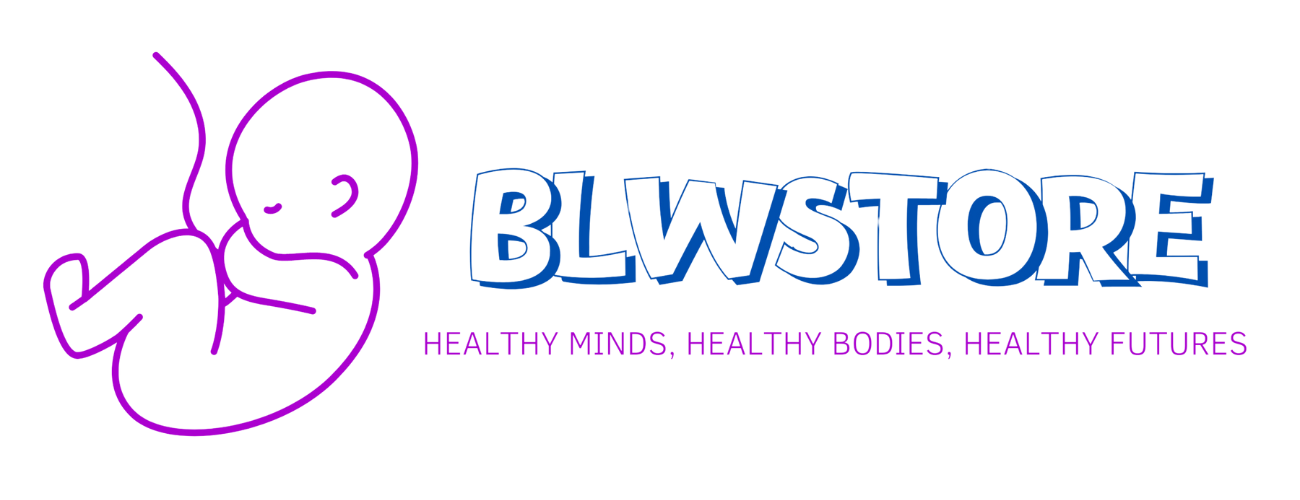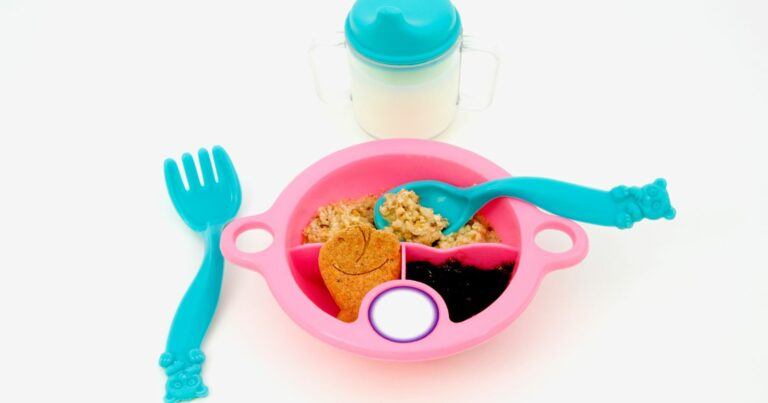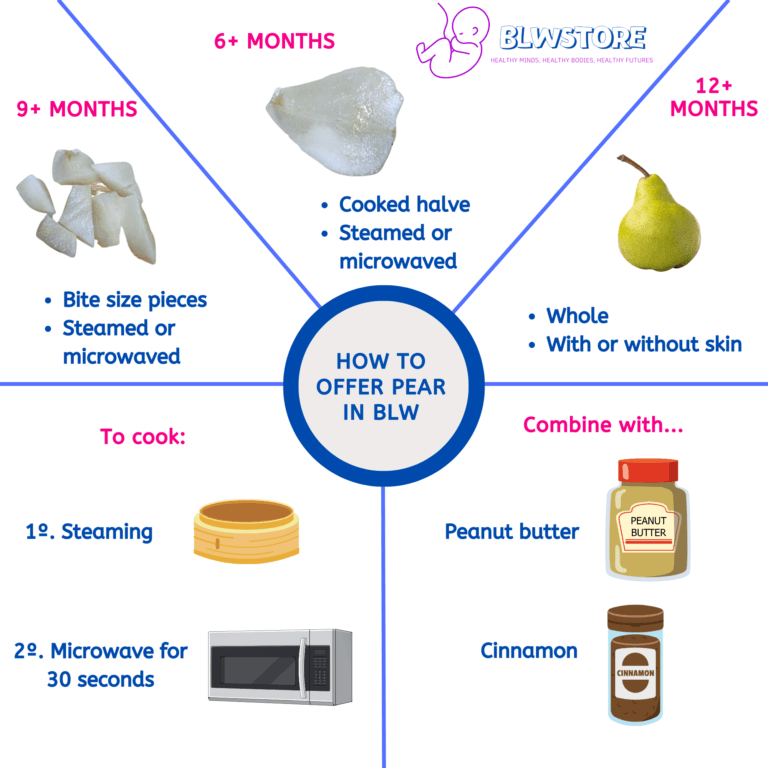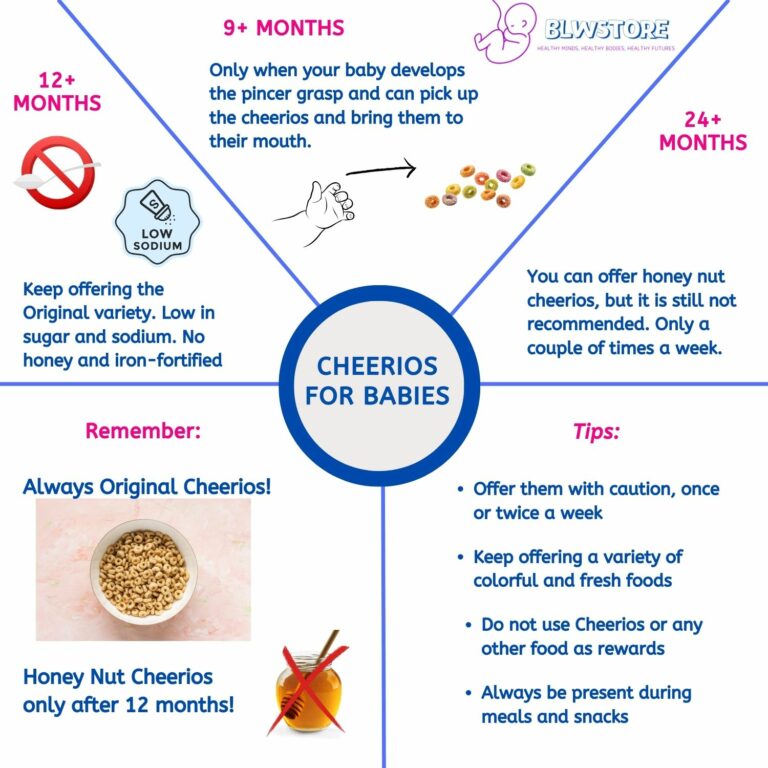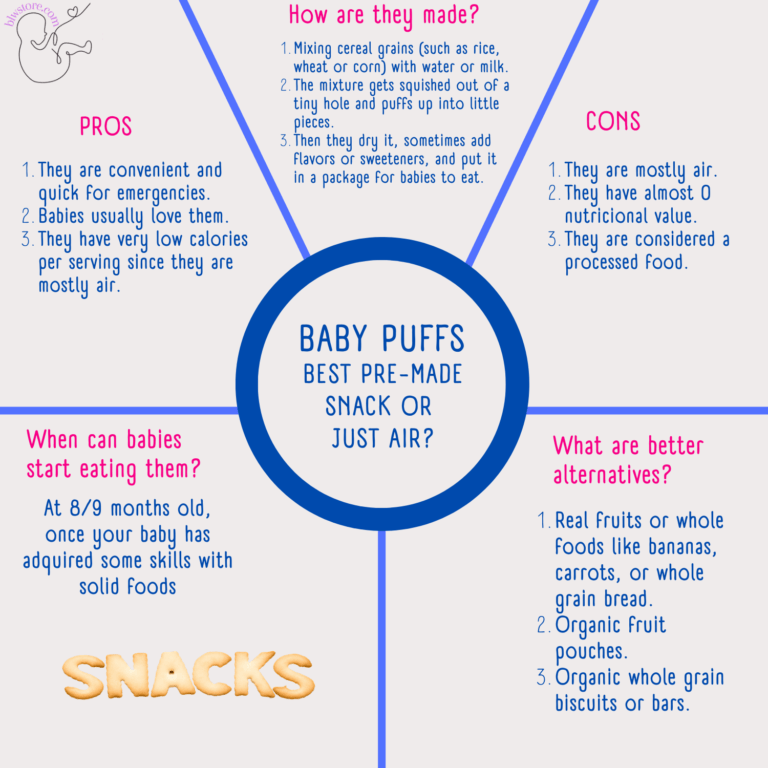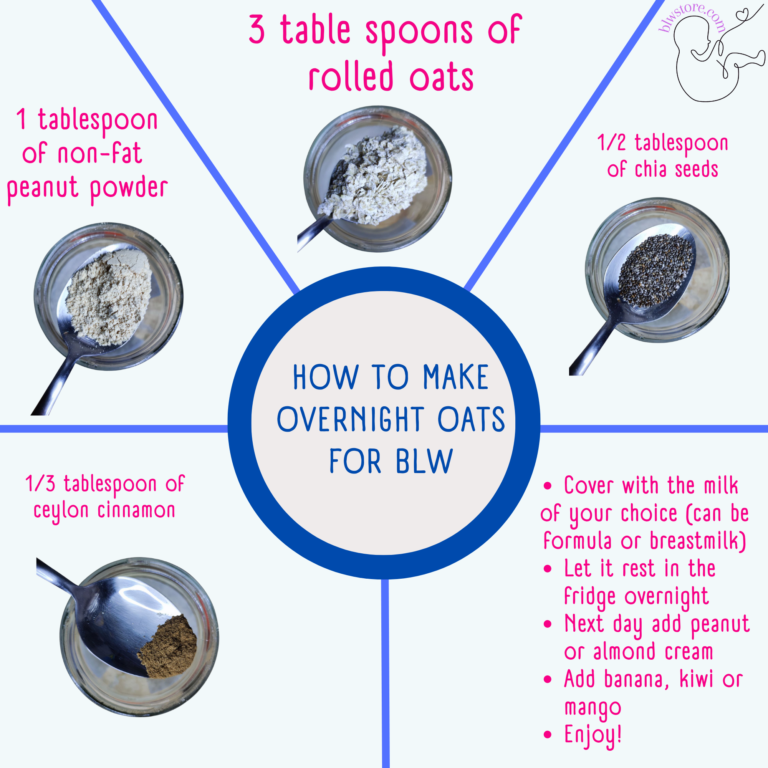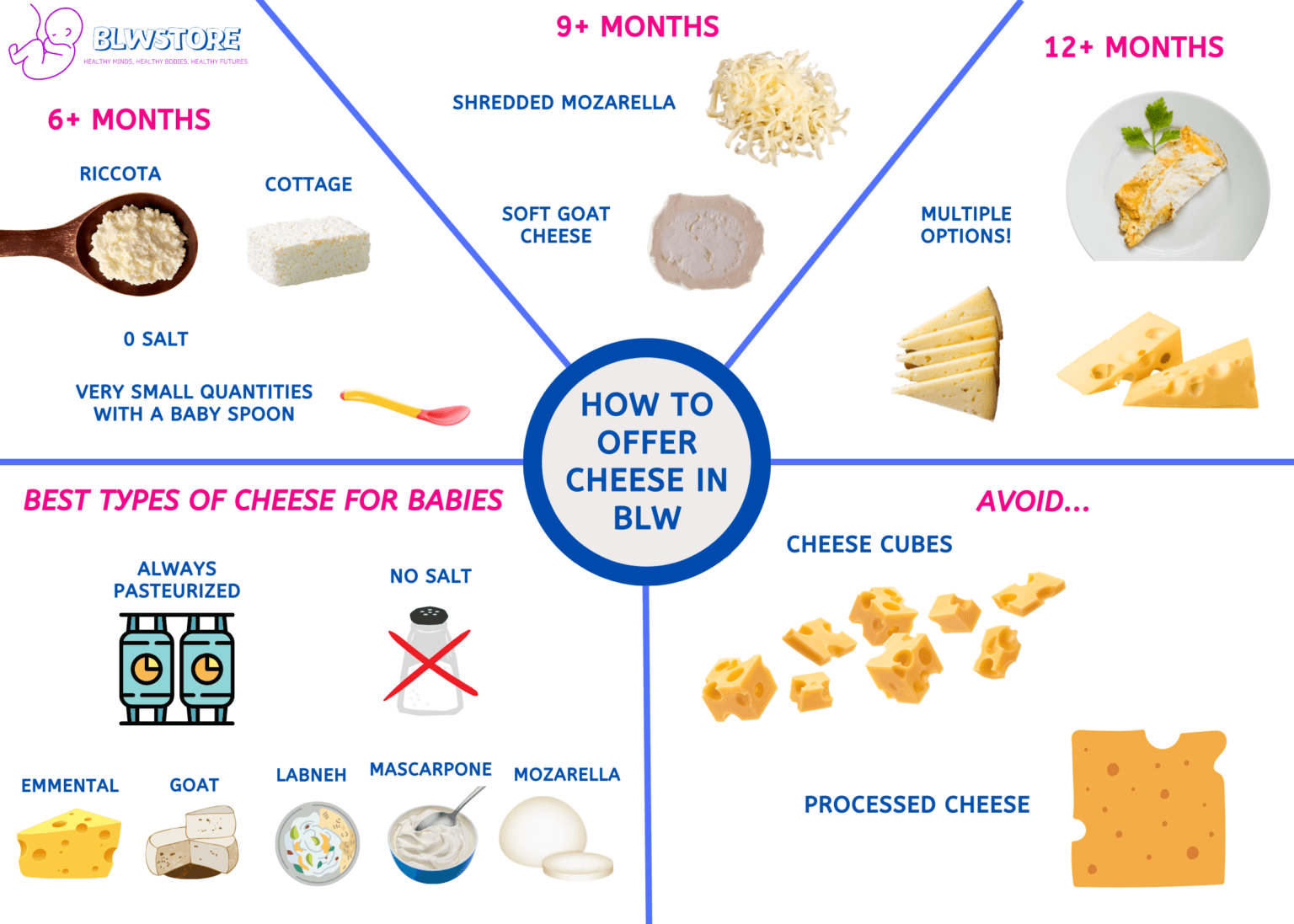
Babies can start having cheese as soon as they start with solid foods, however, the type of cheese you offer is critical.
It’s recommended to start with cottage or ricotta cheese because their salt content is low. As your baby grows, you can start offering more and more types, following what the picture above recommends.
Whether or not you are familiar with Baby-led weaning (a method for introducing solid foods that has recently gained popularity), this article will answer all your questions about cheese and babies.
We have been where you are, and we are aware of the doubts faced by parents who wish to introduce cheese to their babies in a secure manner. So let’s not waste any more time!
Let’s get after it!
– Keep learning: dairy products and yogurts.
When to Introduce Cheese to Your Baby
When can babies have cheese?
The answer depends on the type of cheese.
Cheeses that are pasteurized (not raw) and low in sodium may be introduced as soon as a baby is ready to start solids, usually around 6 months of age. However, pediatricians recommend waiting until they are 9 months of age, at least in Europe.
Some examples of pasteurized, low-sodium cheeses that are safe to introduce to babies include emmental cheese, goat cheese, labneh, mascarpone, fresh mozzarella, paneer, ricotta, and Swiss cheese. However, higher sodium cheeses can be offered in moderation only after 12 months. However, as parents and nutritionists, we have not yet offered high-sodium cheese to our 3-year-old son.
Safety Concerns for Introducing Cheese to Babies
Raw milk cheese, unpasteurized or “artisanal” cheese, should be avoided, as it may contain harmful bacteria that can cause food poisoning.
Also, babies should avoid cheeses high in salt content, which can harm their developing kidneys. It’s also crucial to be mindful of the texture of the cheese. Start with soft cheese similar in texture to thick baby foods, such as ricotta, blended cottage cheese, or farmer’s cheese.
As your baby grows and develops, you can gradually move on to other types of cheese with different textures, always being careful to avoid complex or large chunks of cheese, which can be a choking hazard.
How to Prepare Cheese for Your Baby in BLW
Every baby develops at their own pace, and the following recommendations are generalizations for a broad audience.
Your child may have needs or considerations beyond generally accepted practices. However, using the best available scientific information on gross and oral motor development can help minimize the choking risk.
How to Prepare Cheese for Babies, Depending on Their Age
6+ Month babies
For babies 6 months or older, offer very soft cheeses such as ricotta, cream cheese, farmer’s cheese, or very soft goat cheese from a baby spoon.
Alternatively, you can spread it on a lightly toasted piece of bread for baby-led weaning.
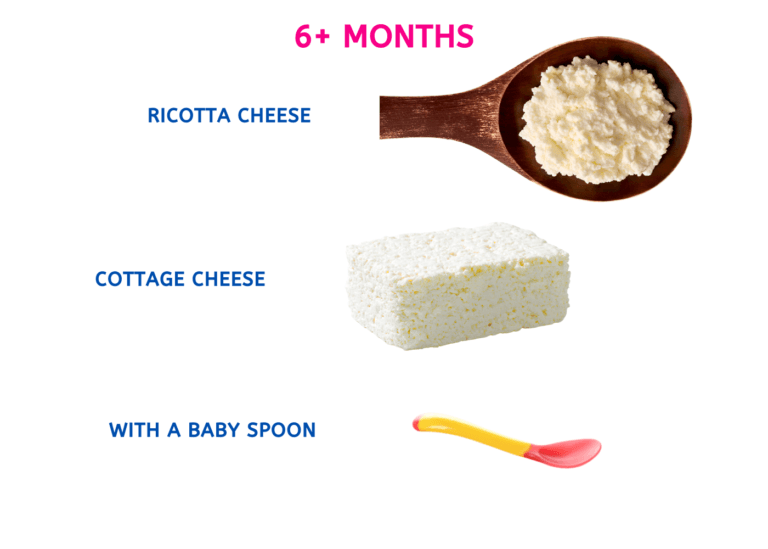
9+ month babies
For babies who are 9 months or older and can pick up smaller pieces of food with their fingers, offer soft goat cheese crumbles or soft shredded cheeses like mozzarella as a Stage 3 baby food or early finger food option.
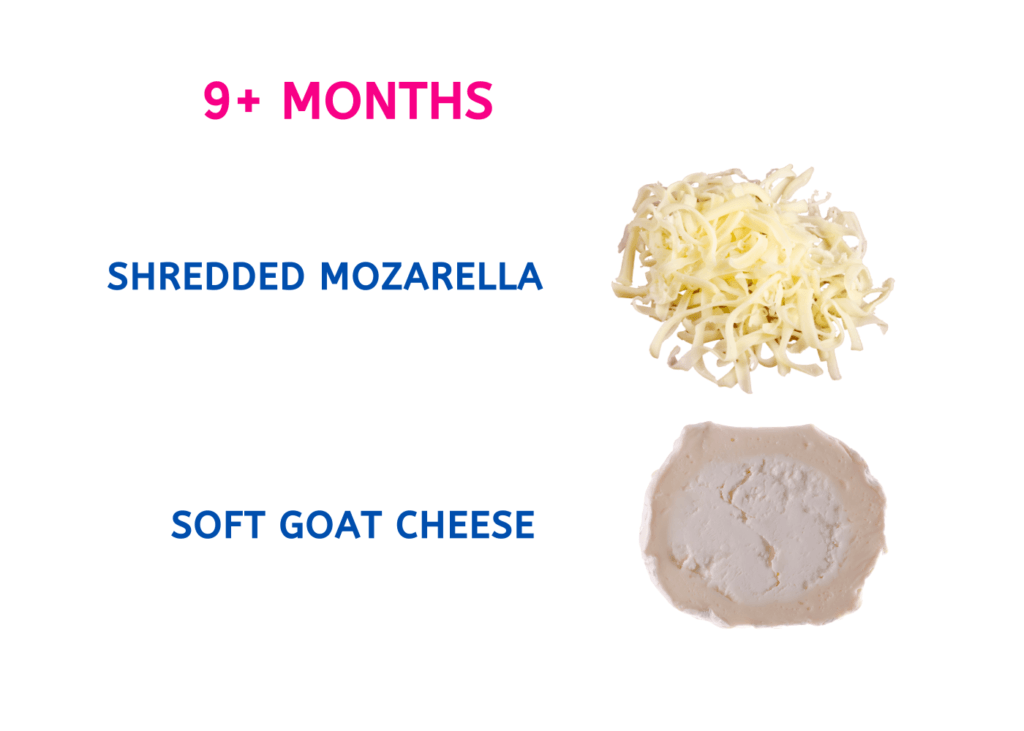
12+ month babies
For babies over 12 months old, offer soft cheeses, melted or thinly sliced semi-firm cheeses, or melted, crumbled, or grated hard cheeses in various ways, such as on bread, eggs, vegetables, or folded into grain or bean dishes.
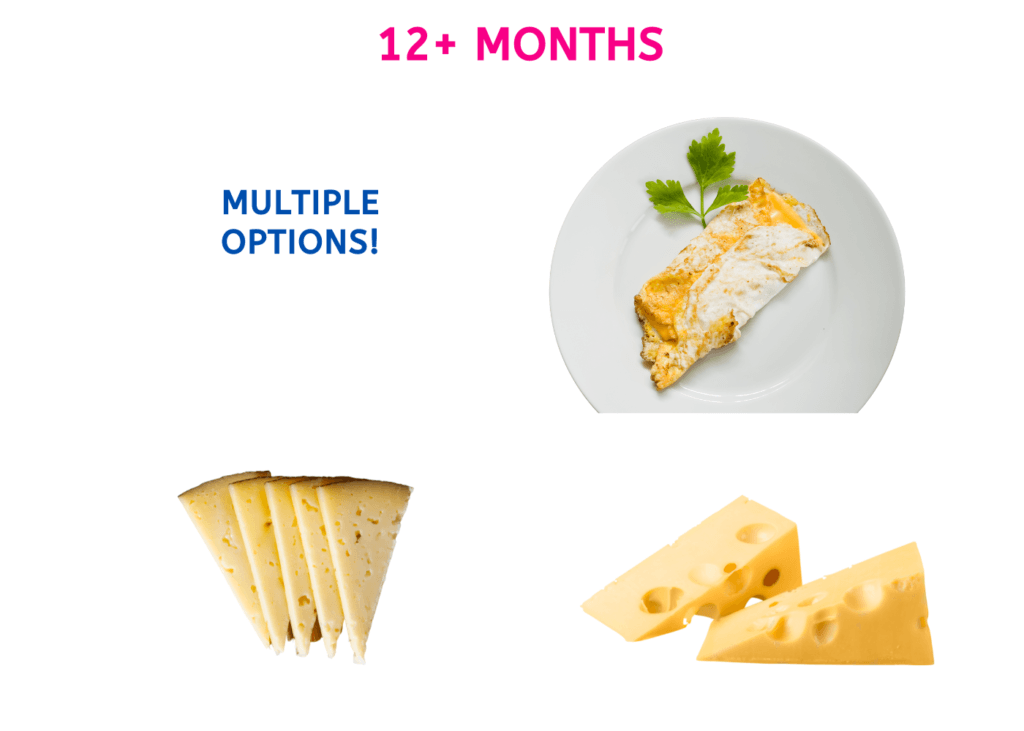
Cheese can be a great addition to pasta sauce or on top of roasted sweet potatoes.
You can also blend soft cheeses in a food processor to create a very soft cheese that can be spread on baby finger foods.
Make sure the child is in a safe eating environment, and never serve cheese on the go in a stroller, car seat, or when your toddler is running around.
Also, continue to avoid cheese cubes and raw/unpasteurized cheeses.
What Is the Recommended Texture of Cheese for Babies?
For babies just starting solids, offer soft cheese similar in texture to thick baby foods, such as ricotta, blended cottage cheese, or farmer’s cheese, for babies who are nine months or older and can pick up smaller pieces of food with their fingers, offer soft goat cheese crumbles or soft shredded cheeses like mozzarella.
Then, as they grow, babies can gradually move on to other types of cheese with different textures, always being careful to avoid complex or large chunks of cheese, which can be a choking hazard.
Is Cheese Healthy for Babies?
Cheese is a nutritious meal for your baby’s diet, high in calcium and other essential nutrients. Low-sodium options include emmental, cottage cheese, and labneh, one of the best spreadable cheeses for babies.
Always examine the cheese’s nutritional content and sodium levels. Low-sodium cheeses include emmental, cottage cheese, fresh mozzarella, paneer, ricotta, swiss cheese, and labneh.
Our recommendation is to avoid high-sodium cheese variants such as processed cheeses
(cheddar cheese, processed cheese slices…) and always choose cheese prepared from pasteurized milk.
Labneh is one of the best spreadable cheeses for babies because it is soft and low in salt.
Don’t forget to provide cheese in moderation, around 2-4 times a week.
Is Cheese a Common Allergen?
Yes. Cheese is a popular allergenic food since it is made from cow’s milk, a common allergen in young children, accounting for around one-fifth of pediatric food allergies.
Other ruminant dairy products, such as those from sheep, goats, and buffalo, may cause similar allergic reactions to cow’s milk dairy products.
Introducing Cheese to Babies at Risk of Developing Allergies
Introducing allergens to babies as early as possible reduces their likelihood of developing allergies later in life.
It is best to introduce it as soon as they begin meals and to keep offering it frequently.
Even for babies at high risk of developing allergies, introducing allergenic foods early, between 6 months of age is beneficial, always monitoring possible reactions.
Always start with a small amount on its own for the first few servings. Then, if no adverse reaction occurs, gradually increase the quantity over subsequent portions.
Is Cheese a Choking Hazard?
Cheese is a common choking hazard for babies and children, so avoiding specific shapes like small cubes, thick slices, or cylindrical shapes (think cheese strings/sticks) is essential.
These shapes make it the perfect size to get lodged in your baby’s airway and won’t dissolve easily with saliva.
Serving Cheese to Babies to Avoid Choking Hazards
It’s crucial to slice cheese thinly or grate it and avoid doing cheese cubes.
Focus on soft, spreadable cheeses until the baby has developed coordinated biting and chewing.
Additionally, thick melted cheese can be a choking hazard, so offering thinly spread-out layers of melted cheese to new eaters is best.
As toddlers’ oral motor skills develop at different rates, it is essential to monitor their chewing abilities and decide how to serve cheese accordingly.
Is Organic Cheese Better than Ordinary Cheese?
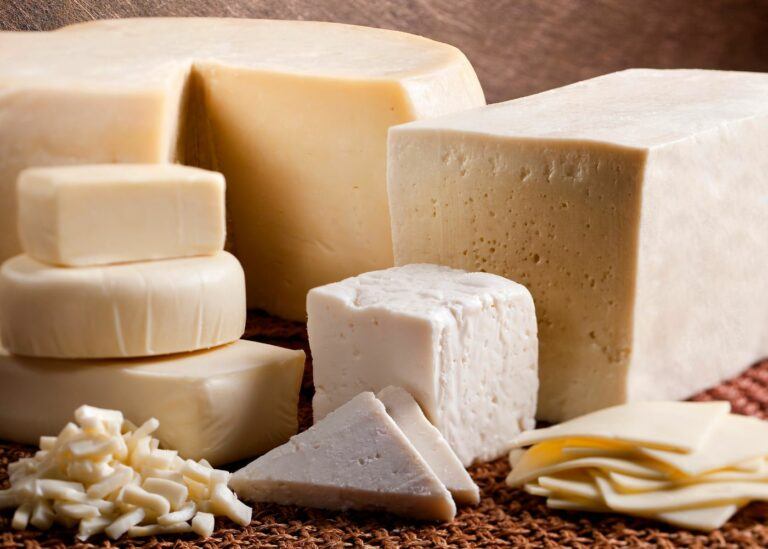
While organic cheese may offer the benefit of being free from antibiotics and hormones, it is important to note that both organic and non-organic cheese can be part of a healthy and nutritious diet for your child, as they offer the same levels of essential nutrients such as protein, fat, vitamins, and minerals.
It’s up to you to feed your child organic cheese. Organic cheese is unnecessary, but some individuals (including us) consume organic foods to protect themselves from industrial pesticides and fertilizers.
Being manufactured from organic milk, which comes from animals not given antibiotics or hormones, organic cheese has the advantage of being free of these additives. Some parents may find this crucial if they want to keep antibiotics and growth hormones out of the food they feed their infants.
Both organic and non-organic cheese offer comparable levels of protein, fat, vitamins, and minerals in terms of nutritional value.
What is the best first cheese for a baby?
If we had to choose just one, fresh goat cheese or labneh would be the best first cheese for our baby. These spreadable, soft cheeses are excellent for introducing new tastes and sensations to babies because they are simple to add to a baby’s diet and have a milder flavor than other cheeses.
It’s crucial to note that when choosing cheese for a newborn, it’s ideal to select whole-milk varieties that are pasteurized and low in sodium.
Emmental cheese, cottage cheese, paneer, and ricotta are other excellent choices. They are all abundant in nutrients and low in salt.
Is cheese hard for babies to digest?
Due to its high fat and low fiber content, cheese may be complex for infants to digest and may even cause constipation. You shouldn’t have any problems, though, so long as your infant gets the recommended 1 to 2 ounces daily or per couple of days.
Baby constipation can be prevented by feeding them meals high in the correct kind of fiber and giving them enough water.
However, cow’s milk can be difficult for babies to digest and does not contain the necessary nutrients. Thus, it is recommended to wait until the baby is at least a year old before feeding it to them.
Can Babies Eat Babybel Cheese?
Yes, but only after 12 months of age.
This is because one single babybel has 150 mg of sodium. The recommended amount for a baby from 7 to 12 months is 370 mg, and they get this amount only from breast milk or infant formula, and other foods in their natural state.
From 1 to 3 years, this amount increases to 800 mg, giving us more room to increase the amount of sodium in our child’s diet.
How To Cut Babybel For Baby
If you introduce it before the age of one year, it is best to offer it whole, already peeled, so the baby can pick it up and nibble it.
You can also cut it into thick strips, always keeping an eye on it.
Is Vegan cheese OK for babies?

Yes, vegan cheese is safe for babies, but parents must be careful when choosing the right product. Vegan cheese may be a good substitute for infants sensitive to or allergic to dairy products.
However, parents should carefully read the label and select goods with minimal salt and preservative levels. In addition, vegan cheese’s nutritional content differs significantly from real cheese’s, which provides nutrients crucial for developing children, including protein, vitamin A, vitamin B12, calcium, and other minerals.
Therefore, your baby’s primary source of nutrition shouldn’t be vegan cheese. However, families with vegetarian members should carefully review the ingredients list because some cheeses utilize rennet sourced from animals to help curdle the milk.
How frequently should cheese be given to babies?
Serving dairy from solid foods a few times a day is advised for babies and toddlers… Most infants under 12 months receive all the calcium they require through breast milk or formula.
It’s vital to remember that cheese should only be given to infants in moderation when considering how frequently it should be given to them. While full-fat cheese gives infants healthy fats and nutrients, overeating it might cause constipation and digestive problems.
Serving dairy from solid foods a few times a day is advised for babies and toddlers. For example, one serving could be a few ounces of yogurt, one slice of low-sodium cheese, or some boiled cow’s milk. Most infants under 12 months receive all the calcium they require through breast milk or formula.
Toddlers require more calcium starting at 12 months. Therefore they should consume 2 servings of dairy products each day. One dairy serving constitutes one cup of whole milk, a suitable fortified milk replacement, one ounce of low-sodium cheese, or around seven ounces of yogurt.
Additionally, consuming too much dairy can raise the risk of getting iron-deficiency anemia. Therefore, although cheese can be provided daily, if your infant or toddler consistently prefers it to other meals and eats a lot of it in one sitting, you might want to consider providing it less frequently during the week to encourage a balanced diet.
What is the best cheese for a lactose-intolerant baby?
It is advised to avoid dairy-based cheese if your infant has lactose intolerance altogether. Instead, you can use certain non-dairy substitutes manufactured from soy, almonds, or vegetables sold in the market.
To ensure that the product doesn’t contain lactose or milk proteins, it’s crucial to read the label carefully. Nut-based cheese, tofu-based cheese, or plant-based cheese created from components like potatoes, tapioca, or vegetables are some alternatives for non-dairy cheese.
BLW Cheese FAQ
What is the best cheese for baby-led weaning?
The best cheese for baby-led weaning is a low-sodium cheese that is easy for little fingers to pick up and chew.
Mozzarella and string cheese are great choices because they can be cut into small pieces and have a mild flavor.
Avoid aged cheeses, mold-ripened cheeses, and high-sodium cheeses because they have a stronger flavor and may not be well-tolerated by babies.
Is cheese a good option for baby’s first foods?
No, cheese should be introduced no earlier than the nine month mark. Although cheese is a nutritious food that can be part of a balanced diet, it is essential to wait until around nine months to introduce it as a first food.
Be aware that some babies may have a milk allergy or cow’s milk protein allergy, so it’s essential to watch for any signs of allergic reaction when introducing cheese.
How much cheese should I offer my baby?
When offering cheese to your baby, start with a small amount and offer it in small pieces that are easy to pick up and chew.
Only offer cheese in very small amounts until the 24-month mark and even then it is better to be conservative.
What are some things to watch out for when introducing cheese to my baby?
If you have a family history of dairy intolerance or your baby has a milk allergy, be cautious when introducing cheese.
Some cheeses may also have a higher amount of sodium, so be sure to check the label and choose a low-sodium cheese.
Stronger cheeses should be avoided until your baby is older and their taste buds have developed.
Conclusion
As long as it is done securely and in moderation, introducing cheese to your newborn can be a nutritious addition to their diet.
Pasteurized, low-sodium cheeses such as emmental, goat cheese, labneh, mascarpone, fresh mozzarella, paneer, ricotta, and Swiss cheese are ideal for baby-led weaning.
Avoid high-sodium, raw or unpasteurized cheeses to reduce choking dangers, and be cautious of texture. Some cheese forms can be administered as early as six months of age.
However, they should be given in moderation due to their high sodium content. In addition, it is suggested that parents of babies at risk of developing allergies introduce allergenic foods, including cheese, as early as feasible.
Cheese can be a great option for baby-led weaning as part of a balanced diet. Mozzarella and string cheese are good options for little fingers, and grated cheese can be added to many dishes.
Be aware of any family history of dairy intolerance or milk allergy and always watch for signs of allergic reaction.
Cheese can be a healthy and delicious addition to your baby’s diet by choosing the right cheese and offering it in appropriate amounts.
We’re Maria and Alberto, a married couple and educators who are nutrition enthusiasts. Even before we had kids, we were already crazy about nutrition.
We’d read scientific articles, watch videos from nutritionists, and spend hours listening to nutrition podcasts.
Today, we continue doing this, but in a different way, as we’ve learned to sift through the noise and trends. Nutrition, like any other field of knowledge, the more you read and learn, the more you develop a comprehensive understanding of reality, and that’s what has happened to us.
Before having our first child, we focused on learning everything we could about child nutrition, using the same techniques we had already employed, backed by our extensive knowledge in nutrition.
Our mission is to help other parents with their children’s nutrition, to help them become the best versions of themselves.
If we are what we eat and drink, which is absolutely true, let’s do it right!
